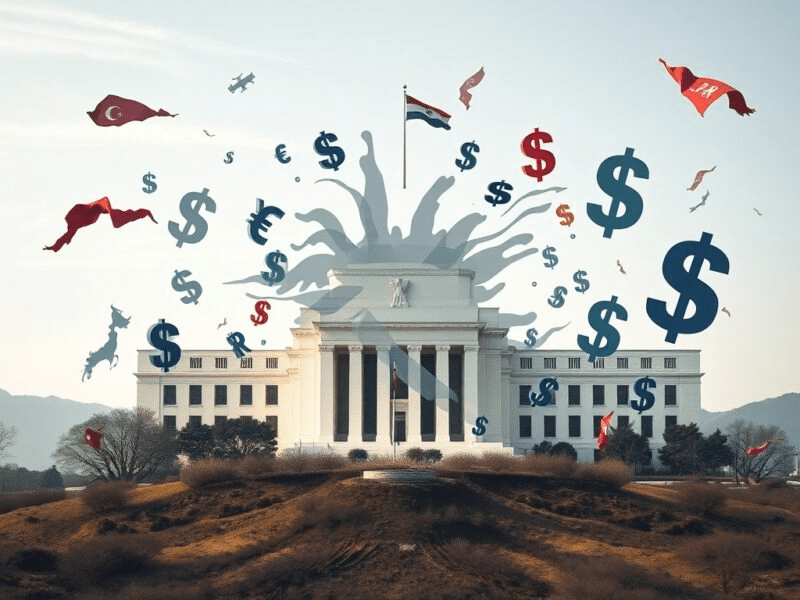according to the materials of the site - By ItsBitcoinWorld

The Asian currency market is facing critical uncertainty amid the Fed's reorganization: the rupee is under pressure
In the complex dance of global finance, even the slightest change in a major economy can cause ripples across all continents. For those who closely monitor the cryptocurrency space, understanding these macroeconomic changes is paramount, as they often dictate investor sentiment and capital flows into alternative assets. Recently, discussions of a potential reorganization of the Fed by former President Donald Trump have sparked much debate, particularly regarding its ambiguous influence on the Asian currency market and the invariably dominant US dollar. While immediate consequences may seem limited to many, the Indian rupee has found itself in a more precarious position, highlighting the complex interplay of global politics and local economic vulnerabilities on vast currency markets.
The Federal Reserve System, the central bank of America, plays a key role in determining monetary policy, affecting everything from interest rates to inflation. Any speculation about political interference or significant restructuring of the Fed's leadership and philosophy, often referred to as 'Fed reshuffle', naturally raises eyebrows around the world. When a figure like Donald Trump hints at such changes, it signals a potential shift in the long-standing independence of the Fed and its approach to managing the economy.
Historically, the Federal Reserve has sought to act independently of political pressure, making decisions based on economic data rather than electoral cycles. 'Reshuffling' may involve:
New appointments in leadership: The President has the right to appoint Fed governors and the chair, potentially placing individuals who share his economic views in key positions.
These changes reverberate worldwide, affecting capital flows and investor confidence, which in turn impacts various segments of currency markets, including in Asia.
Despite discussions of a potential Fed reshuffle, the US dollar has often shown remarkable resilience. Its status as the primary global reserve currency and safe asset during periods of global uncertainty means it often experiences only limited immediate negative impacts from domestic political machinations, especially compared to more volatile currencies of emerging markets.
Several factors contribute to the stability of the dollar's position:
Liquidity and depth: The US Treasury bond market is the deepest and most liquid in the world, making dollar-denominated assets attractive for large-scale investments and hedging.
Global trade and finance: A significant portion of international trade and financial transactions is conducted in dollars, ensuring a constant demand for the currency.
While the Fed's reorganization could theoretically lead to changes in interest rate differentials, which typically affect currency values, the fundamental advantages of the dollar often protect it from sharp fluctuations. However, sustained divergence in policy or perceived political interference could undermine long-term confidence, although this is a gradual process.
The currency landscape of Asia (Asia FX) is incredibly diverse, encompassing economies from major exporters like Japan and South Korea to developing giants like China and India. Therefore, the influence of a potential Fed reorganization on these currencies is quite ambiguous, often limited in a general sense but pronounced for individual countries.
The currencies of many developed Asian economies tend to respond more to global risk sentiment and specific trade dynamics than solely to changes in US monetary policy.
While much of the Asian currency markets may weather the Fed's reorganization with limited immediate effect, the Indian rupee (INR) often finds itself under particular pressure. India, as a fast-growing but import-dependent economy, has certain structural vulnerabilities that make its currency especially sensitive to global capital flows and US monetary policy.
Beyond the immediate issues related to the Fed's reorganization, the global economic situation presents both challenges and opportunities. These include persistent inflation, a potential slowdown in the global economy, and ongoing geopolitical tensions that may disrupt supply chains and trade. For emerging markets like India, managing growth while simultaneously controlling inflation and external deficits remains a complex task.
However, opportunities also arise. Periods of currency volatility can create entry points for investors. For example, a temporary weakening of the Indian rupee may make Indian assets more attractive to foreign investors seeking higher yields. Moreover, the pursuit of economic diversification in Asia may lead to the emergence of new growth sectors and investment opportunities that are less dependent on traditional US monetary policy.
The global shift toward digital currencies and blockchain technology also offers an interesting parallel. While traditional currency markets grapple with political influence and economic volatility, the decentralized nature of cryptocurrencies represents an alternative narrative, attracting those in search of it.
With us (in this group !), as a rule, remain those (subscribers !), who are looking for fresh and relevant news, do not want to browse dozens of different sites and news publications, but can afford to read all the most interesting in one news feed !!! 😉
Enjoy your viewing !!! 😊



